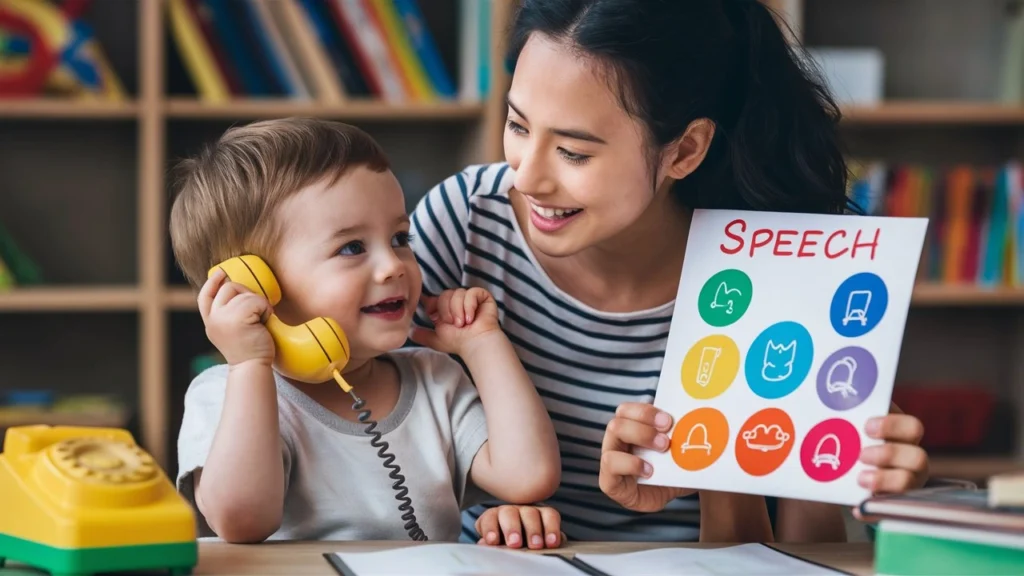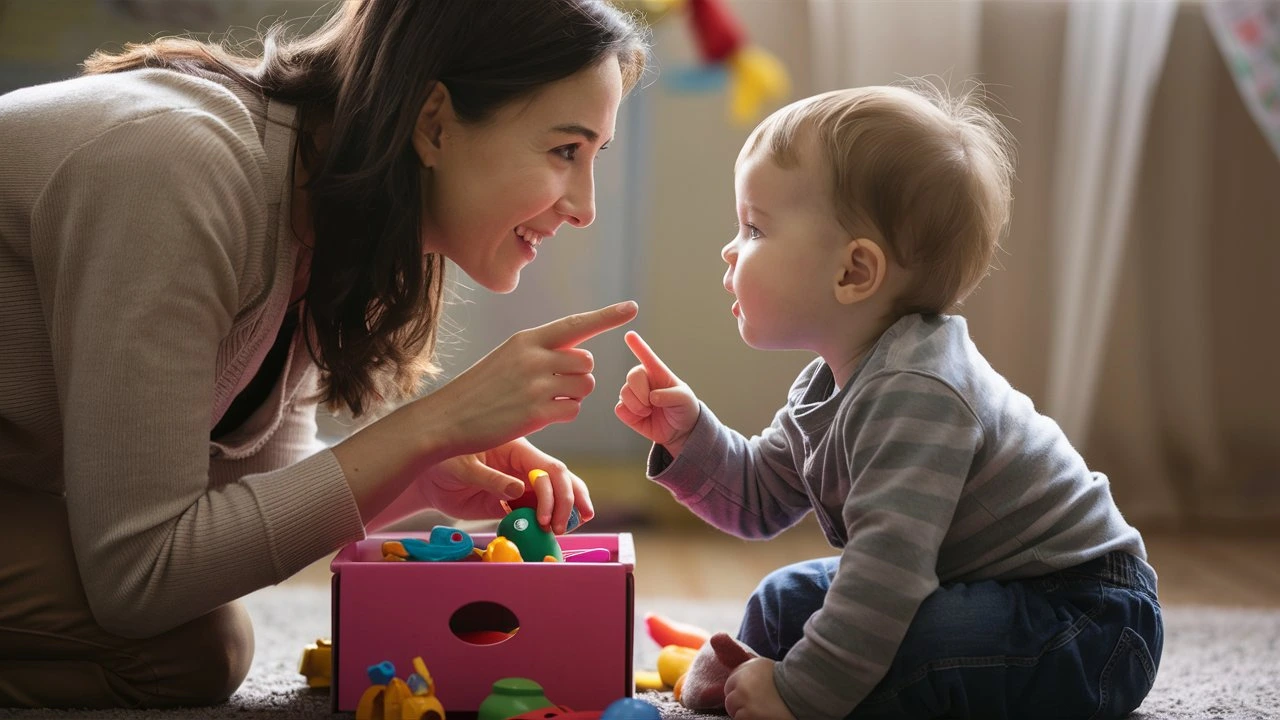Essential Stages of Speech and Language Development for Your Child’s Success
Table of Contents
Introduction
Understanding your child’s language journey can help you provide the right support at each stage, setting the foundation for their future communication, learning, and social skills. Language development isn’t just about speaking; it’s about learning to understand and be understood, a crucial part of a child’s growth. By learning about the stages of speech and language development, you can help your child build the skills they need to succeed both in school and in life.
Section 1: Why Language Development is Key to Success
Language is more than just words—it’s how your child learns to connect with the world, build relationships, and develop cognitive skills. Early language skills are tied to academic success, better social connections, and improved self-expression. A rich language environment, where you interact frequently, makes all the difference.
- Language and Cognitive Skills: Learning words and sentences helps children process complex information, improve memory, and understand cause-effect relationships.
- Social and Emotional Development: Effective communication strengthens emotional bonds and aids social skills like empathy.
Section 2: Understanding the Difference Between Speech and Language
To support your child’s growth, it’s important to understand the difference between speech and language.
- Language: Refers to the words we use and how we use them to share ideas, needs, and desires. It includes both receptive language (understanding) and expressive language (speaking).
- Speech: Involves the physical ability to talk—using sounds, words, and intonation to convey language.
Section 3: Key Stages of Speech and Language Development

Stage 1: Infancy (0–12 Months)
In infancy, communication starts with crying, cooing, and early babbling. Your baby’s brain is forming connections through sound and interaction, preparing them for future language skills.
- Milestones:
- 0–3 months: Reacting to sounds, cooing, and crying with different tones.
- 4–6 months: Babbling begins, experimenting with sounds like “ba-ba” and “da-da.”
- 7–12 months: Recognizing names, understanding basic words like “no,” and saying their first words like “mama” or “dada.”
| Milestone | Age |
|---|---|
| Cooing | 0–3 months |
| Babbling | 4–6 months |
| First words | 7–12 months |
Stage 2: Toddlerhood (1–3 Years)
In this stage, your child will experience a rapid increase in vocabulary. They begin to understand simple commands and form short phrases.
- Milestones:
- 12–18 months: Vocabulary of around 20 words, starting with simple nouns and verbs.
- 18–24 months: Combining words to form short phrases; understanding and following simple instructions.
- 24–36 months: Vocabulary explosion with up to 300 words, forming simple sentences, and starting to ask “what” and “where” questions.
| Milestone | Age |
|---|---|
| Vocabulary growth | 12–18 months |
| Simple phrases | 18–24 months |
| Full sentences | 24–36 months |
Stage 3: Preschool (3–5 Years)
Preschoolers use language to interact with others, express emotions, and develop their sense of identity. During these years, you’ll notice significant strides in sentence structure, vocabulary, and grammar.
- Milestones:
- 3–4 years: Can use complete sentences; understands and uses basic grammar.
- 4–5 years: Tells stories, describes events, and begins using more complex sentences.
| Milestone | Age |
|---|---|
| Complete sentences | 3–4 years |
| Storytelling | 4–5 years |
Stage 4: School-Age (5+ Years)
At this stage, children’s language skills become more refined, preparing them for academic and social demands. They use language for learning, socializing, and expressing complex thoughts.
- Milestones:
- 5–7 years: Increased vocabulary, follows multi-step directions, and speaks fluently.
- 7+ years: Can describe concepts in detail, use language for reasoning, and adapt speech based on the situation.
| Milestone | Age |
|---|---|
| Follows multi-step directions | 5–7 years |
| Detailed storytelling | 7+ years |
Section 4: Factors Influencing Language Development
Language development is shaped by various factors. Here’s what impacts your child’s language abilities:
- Interaction with Adults: Regular, positive interaction boosts language acquisition.
- Access to Books and Reading: Reading together builds vocabulary and understanding.
- Peer Interaction: Playing with others builds communication skills.
- Genetics and Health: Hearing, vision, and neurological health can impact language.
Section 5: Tips to Support Each Stage of Language Development
Infancy:
- Engage in baby talk: Repeat sounds your baby makes, talk about what you’re doing, and read picture books.
Toddlerhood:
- Name and Explain: Name objects, explain daily activities, and encourage your toddler to repeat words.
Preschool:
- Encourage Storytelling: Ask open-ended questions and let your child describe their day.
School-Age:
- Discuss Ideas and Feelings: Have conversations about school, friends, and new concepts they learn.
| Tip | Stage |
|---|---|
| Talk about daily routines | Infancy |
| Use descriptive language | Toddlerhood |
| Ask open-ended questions | Preschool |
| Discuss new ideas | School-Age |
Section 6: Recognizing and Addressing Speech and Language Delays

Early detection and intervention are crucial if your child has language delays. If you notice the following signs, consider consulting a speech-language pathologist:
- By 12 Months: Not responding to sounds, no babbling.
- By 24 Months: Less than 50 words, doesn’t use two-word phrases.
- By 3 Years: Limited sentence formation, unclear speech.
Section 7: FAQs on Language Development
Q1: What can I do to help my child’s language development at home?
Encourage conversation, read together, and give them opportunities to express themselves.
Q2: When should I be concerned about my child’s speech development?
If your child isn’t meeting the milestones mentioned, consider a professional evaluation.
Q3: Does screen time affect language skills?
Excessive screen time can reduce interaction, which is essential for language development. Limit screen time and focus on interactive activities.
Q4: How important is reading to my child?
Reading is one of the best ways to boost vocabulary, comprehension, and love for language.
Conclusion
Language development is a journey that varies for every child. By understanding the stages, recognizing your child’s progress, and providing consistent support, you’re setting them up for lifelong communication success. Remember, each small step matters—whether it’s reading a bedtime story, asking about their day, or simply listening to them with patience.
Supporting language is a continuous, rewarding process that strengthens your bond and helps your child thrive in every aspect of life.
References
- American Speech-Language-Hearing Association (ASHA). (Year). Speech and Language Developmental Milestones.
- Mayo Clinic. (Year). Child Development: Understanding Language Milestones.
- Child Development Institute. (Year). Parenting Tips for Speech and Language Development.







